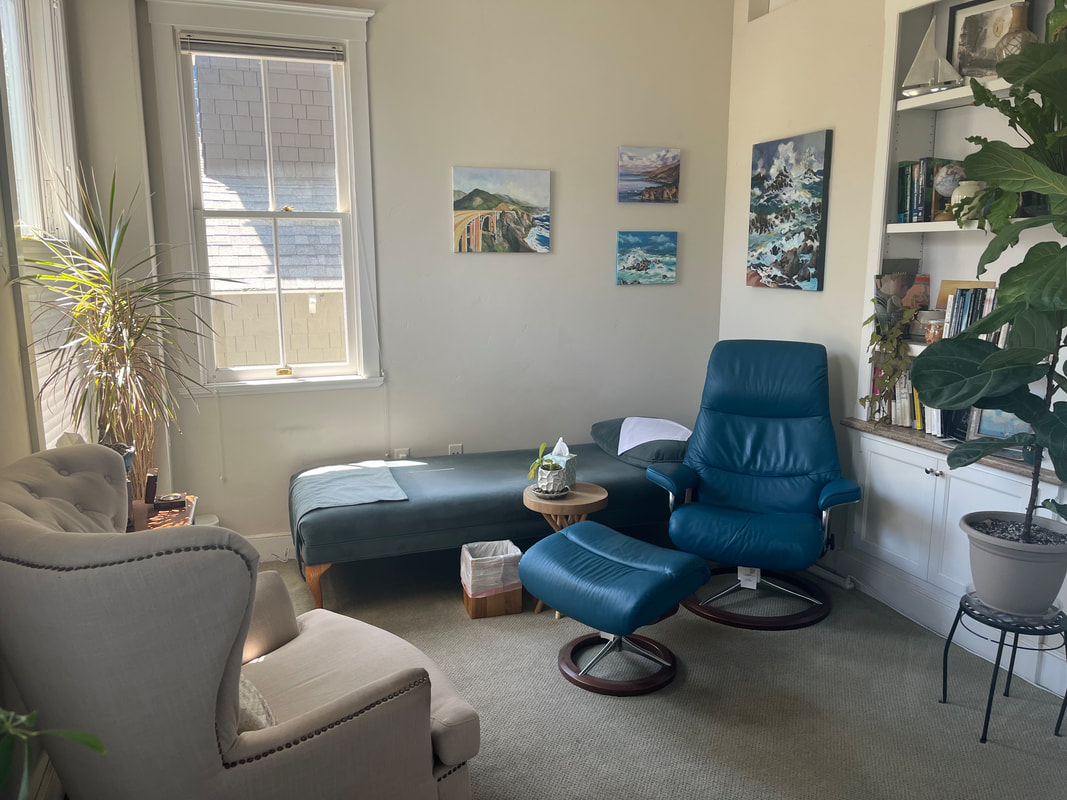
I am a psychiatrist, which is a type of medical doctor specializing in the treatment of conditions affecting the mind. I earned my bachelor of science degree in biological psychology at the University of California, Davis in 2008, obtained my medical doctorate at the UC Davis School of Medicine in 2013, and completed a residency in general psychiatry at the UC Davis Department of Psychiatry and Behavioral Sciences in 2017. I have additional advanced training in psychoanalytic psychotherapy from the San Francisco Center for Psychoanalysis, and received my certification in 2018. Presently, I continue to pursue my passion for this work, and am undergoing training to become a certified psychoanalyst at the Psychoanalytic Institute of Northern California.
I am a member of the Psychoanalytic Institute of Northern California, San Francisco Center for Psychoanalysis, and the Sacramento Psychoanalytic Society. I joined the volunteer clinical faculty at the UC Davis Department of Psychiatry and Behavioral Sciences in July 2017, where I teach psychoanalytic psychotherapy and provide individual supervision and mentorship for psychiatrists in training. I have been practicing psychotherapy since 2015.
When treating my patients, I make use of two primary tools: psychotherapy, including couples therapy, and medications. Below, I have summarized my thoughts about each modality to help you think about if we may work well together.
Medications. Medications can be a powerful tool when used properly for the treatment of psychological distress. However, it is important to have a balanced, realistic view of what they can and can't do, and of the risks and benefits of their use. I have yet to meet a patient who did not have an underlying reason for their psychological distress. In the recent past, psychological suffering was sometimes attributed to the patient having a "chemical imbalance," but this hypothesis has been disproved. Causes or contributors to symptoms of depression, anxiety, PTSD, or other conditions are complex and not always immediately obvious. Many of these symptoms may be related to problematic patterns laid down in early childhood, occurrence of traumatic life events, experiences of abuse and neglect, or other factors. While medications may reduce the intensity of emotional pain someone feels, they will not address these underlying factors. Additionally, many medications can cause uncomfortable or even risky side effects, or may lose the power of their effect over time. I am cautious with my use of medications, and typically do not prescribe them unless my patient and I make a decision that the use of a medicine is necessary. I would not be a good fit for a patient who may be looking for a medical "quick fix," or who prefers not to examine the underlying reasons for why they feel the way they do.
Psychotherapy. Psychotherapy is a collaborative process between a patient (or a couple, during couples therapy) and the therapist that aims to relieve psychological distress and increase understanding and acceptance of the self (and of one's partner, in couples work). There are many different types of psychotherapy; my expertise is in psychoanalytic psychotherapy and modern psychoanalysis. These psychotherapies are based on the formation of a close, strong connection between patients and the therapist that allows us to explore thoughts, emotions, and distress in a way that feels safe. They also operate on the assumption that many of our feelings and motivations are unconscious, or out of our awareness. Psychoanalysis/psychoanalytic psychotherapy can help to provide the necessary safety and guidance to bring our more complete emotional experience into awareness, thus enabling us to live more fulfilled, satisfying lives. They can also help us to develop our ability to relate to others more effectively, as well as strengthen our sense of agency and accountability, which are essential ingredients for psychological change. These therapies can be powerfully effective treatments for a broad constellation of difficulties, including depression, anxiety, tension, anger, problems with relationships, repetitive damaging patterns or behaviors, or chronic feelings of inadequacy or emptiness. That said, these therapies are hard work and are not a quick fix. Though the resultant positive change can be powerful and long-lasting, it typically develops over months or years. These treatments require considerable effort, finances, and time, and are best thought of as an investment in the self. While the treatment timeline for couples therapy tends to be shorter (on average, 6 months to a year), this therapy still requires commitment and hard work.
My approach is warm, attentive, and direct. During our sessions I will listen with the goal of hearing and understanding you, and may at times ask questions for clarification or to help us understand you better. My patients typically see me once or twice weekly for psychoanalytic psychotherapy, though some may come more often if we determine together that more intensive work (psychoanalysis) would best meet their needs. Some of my patients sit up while meeting with me, and others lie down on a psychoanalytic couch. Additionally, I am now offering couples therapy in order to help partners better relate to each other, feel closer, and if applicable, improve their teamwork while parenting.
Humans are social beings, and our relationships powerfully shape our experience of the world. At times, if my patient and I feel it might be helpful, we may have family members attend sessions with the patient in order to more directly address problems that are arising in the family system.
I am a member of the Psychoanalytic Institute of Northern California, San Francisco Center for Psychoanalysis, and the Sacramento Psychoanalytic Society. I joined the volunteer clinical faculty at the UC Davis Department of Psychiatry and Behavioral Sciences in July 2017, where I teach psychoanalytic psychotherapy and provide individual supervision and mentorship for psychiatrists in training. I have been practicing psychotherapy since 2015.
When treating my patients, I make use of two primary tools: psychotherapy, including couples therapy, and medications. Below, I have summarized my thoughts about each modality to help you think about if we may work well together.
Medications. Medications can be a powerful tool when used properly for the treatment of psychological distress. However, it is important to have a balanced, realistic view of what they can and can't do, and of the risks and benefits of their use. I have yet to meet a patient who did not have an underlying reason for their psychological distress. In the recent past, psychological suffering was sometimes attributed to the patient having a "chemical imbalance," but this hypothesis has been disproved. Causes or contributors to symptoms of depression, anxiety, PTSD, or other conditions are complex and not always immediately obvious. Many of these symptoms may be related to problematic patterns laid down in early childhood, occurrence of traumatic life events, experiences of abuse and neglect, or other factors. While medications may reduce the intensity of emotional pain someone feels, they will not address these underlying factors. Additionally, many medications can cause uncomfortable or even risky side effects, or may lose the power of their effect over time. I am cautious with my use of medications, and typically do not prescribe them unless my patient and I make a decision that the use of a medicine is necessary. I would not be a good fit for a patient who may be looking for a medical "quick fix," or who prefers not to examine the underlying reasons for why they feel the way they do.
Psychotherapy. Psychotherapy is a collaborative process between a patient (or a couple, during couples therapy) and the therapist that aims to relieve psychological distress and increase understanding and acceptance of the self (and of one's partner, in couples work). There are many different types of psychotherapy; my expertise is in psychoanalytic psychotherapy and modern psychoanalysis. These psychotherapies are based on the formation of a close, strong connection between patients and the therapist that allows us to explore thoughts, emotions, and distress in a way that feels safe. They also operate on the assumption that many of our feelings and motivations are unconscious, or out of our awareness. Psychoanalysis/psychoanalytic psychotherapy can help to provide the necessary safety and guidance to bring our more complete emotional experience into awareness, thus enabling us to live more fulfilled, satisfying lives. They can also help us to develop our ability to relate to others more effectively, as well as strengthen our sense of agency and accountability, which are essential ingredients for psychological change. These therapies can be powerfully effective treatments for a broad constellation of difficulties, including depression, anxiety, tension, anger, problems with relationships, repetitive damaging patterns or behaviors, or chronic feelings of inadequacy or emptiness. That said, these therapies are hard work and are not a quick fix. Though the resultant positive change can be powerful and long-lasting, it typically develops over months or years. These treatments require considerable effort, finances, and time, and are best thought of as an investment in the self. While the treatment timeline for couples therapy tends to be shorter (on average, 6 months to a year), this therapy still requires commitment and hard work.
My approach is warm, attentive, and direct. During our sessions I will listen with the goal of hearing and understanding you, and may at times ask questions for clarification or to help us understand you better. My patients typically see me once or twice weekly for psychoanalytic psychotherapy, though some may come more often if we determine together that more intensive work (psychoanalysis) would best meet their needs. Some of my patients sit up while meeting with me, and others lie down on a psychoanalytic couch. Additionally, I am now offering couples therapy in order to help partners better relate to each other, feel closer, and if applicable, improve their teamwork while parenting.
Humans are social beings, and our relationships powerfully shape our experience of the world. At times, if my patient and I feel it might be helpful, we may have family members attend sessions with the patient in order to more directly address problems that are arising in the family system.
